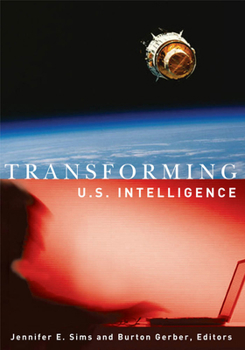Transforming U.S. Intelligence
Select Format
Select Condition 
Book Overview
The intelligence failures exposed by the events of 9/11 and the missing weapons of mass destruction in Iraq have made one thing perfectly clear: change is needed in how the U.S. intelligence community operates. Transforming U.S. Intelligence argues that transforming intelligence requires as much a look to the future as to the past and a focus more on the art and practice of intelligence rather than on its bureaucratic arrangements. In fact,...
Format:Paperback
Language:English
ISBN:1589010698
ISBN13:9781589010697
Release Date:August 2005
Publisher:Georgetown University Press
Length:304 Pages
Weight:1.20 lbs.
Dimensions:0.8" x 7.0" x 9.9"
Grade Range:Postsecondary and higher
Customer Reviews
3 ratings
Good buy
Published by Thriftbooks.com User , 15 years ago
I had to purchase the book for school and we just started going through it, the information is on point and leaves an opening for many discussions. I received the book in more than a timely manner (surprisingly fast actually) and in pristine condition. Highly recommend.
Transforming Intelligence
Published by Thriftbooks.com User , 16 years ago
A good collection on intelligence community topics. It has a variety input since it is a collection of writings from vaious authors.
"Must Read" Superb Collection, But Not Transformative
Published by Thriftbooks.com User , 19 years ago
This is a valuable book and merits careful study by policymakers, practitioners, and students who may be future intelligence professionals. The book is not, however, transformative, nor is it particularly innovative, and for that, I must with reluctance limit it to four stars, but with the caveat that it is a "must read." Some of the best contributions are those of Jennifer Sims, and the deeper that I read into the works of others, the more I wished that she had had the time to make the entire book her own, casting a broader net for iconoclastic thinkers, foreign intelligence practitioners, non-governmental experts in open source intelligence, religious and labor experts on foreign threats from foreign religions, whose thoughts do not appear in this book. The book's major premise is that it was not the institutions that failed, but rather leadership--that all that is needed is a change in priorities, perspective, and methods. This is typical of books written by those who, by their own admission, were "part of the problem." The section on new requirements is more than adequate if one wishes to continue to focus on unilateral secret intelligence about major state threats but fails to acknowledge that we earned a D, at best, on everything else, to include terrorism, proliferation, environmental scarcity, ethnic conflict, and dictatorial corruption (our friends) as a long-term threat to our vision of participatory democracy and moral capitalism. The requirements section suffers from a rather staid focus on states and "actor" threats, with little mention of history, geography, culture, religion, or demographics, all forces vastly more potent than your average failed state or single transnational group. The middle third of the book, on capabilities, is the strongest part of the book. It opens with a chapter on open sources by Amy Sands that I would say is now the best available short summary of that discipline's potential. I especially applaud the focus on the need for analysts (who are NOT under cover) to have professional networks that transcend borders and cultures, and to be comfortable with local as well as global information. Where this important chapter falls short, however, is in failing to recognize that 90% of what we need to know from open sources will never be shared with U.S. "intelligence" and we therefore need an Open Source Agency under diplomatic sponsorship; and that we will never unilaterally collect and process all that we need to know, hence we need a global network of regional information-sharing centers, initially doing open sources, eventually doing all sources. These latter two ideas are transformative, the chapter itself, while very solid, is not. Clandestine intelligence is well covered from a traditional perspective, but stops short by contenting itself with asking for more authority, tighter lanes in the road, and "staying the course." It does have gems of insight on both possibilities and obstacles, and is a g






